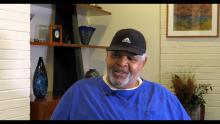
Nathaniel Garland
Albemarle High SchoolThere was only the one high school at the time in the county. So people came from as far away as Greenwood and Afton and places like that, Cismont, Keswick. We all came together. Black and white – Earlysville and Albemarle. Let’s go to Stone-Robinson. Stone-Robinson? That was a eye-opener because there were White kids there that were roughly the same size as me. Because I was a tall kid, but they were 13, 14, 15 years old. Because they had been held back or they didn’t come to school during harvest time because they lived on big farms and stuff, or they went into the hills and helped cut pulpwood with their parents. Well, I didn’t know anything about that. I knew about pulpwood, but I never went, and so when I got into fights with some of these kids, I lost a couple times I went. And a guy named Nelson Talley -- you talk about different people -- he grabs this one kid. He says, “Hey, what are you doing fighting him?” He said, “He as big as me.” He said, “Yeah, but he’s 11 years old. You’re 15.” “Well, I didn’t know.” This kid had been working on the farm, and so he was in great shape, but we looked at each other. “We’re about the same; we’ll do this.” Wow, was that an eye-opening experience, and that’s how life works. You learn these things by doing, but I also met kids there that I enjoyed their conversation with them. They were curious about me. And some of the teachers were very interesting. They taught you they had strict rules, and Nelson Talley stood out because he took care of the recess and the physical stuff. He was a tall guy, and he was always trying to make sure there was a sense of fair play and fairness in what we did. And he would explain things if you didn’t know. I guess I probably had a bewildered or perplexed look on my face sometimes, and he said, “Listen, Nathaniel, lada-dada-da.” I’d go, “Okay.” It made sense.